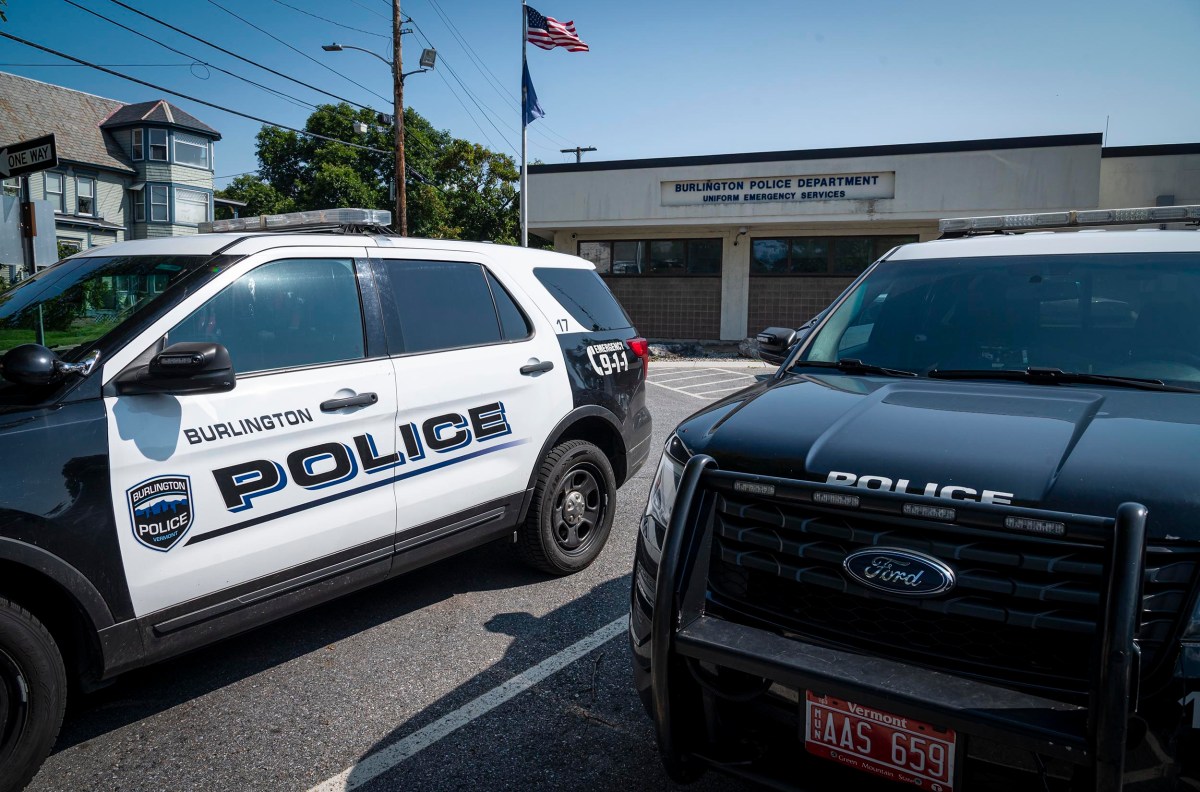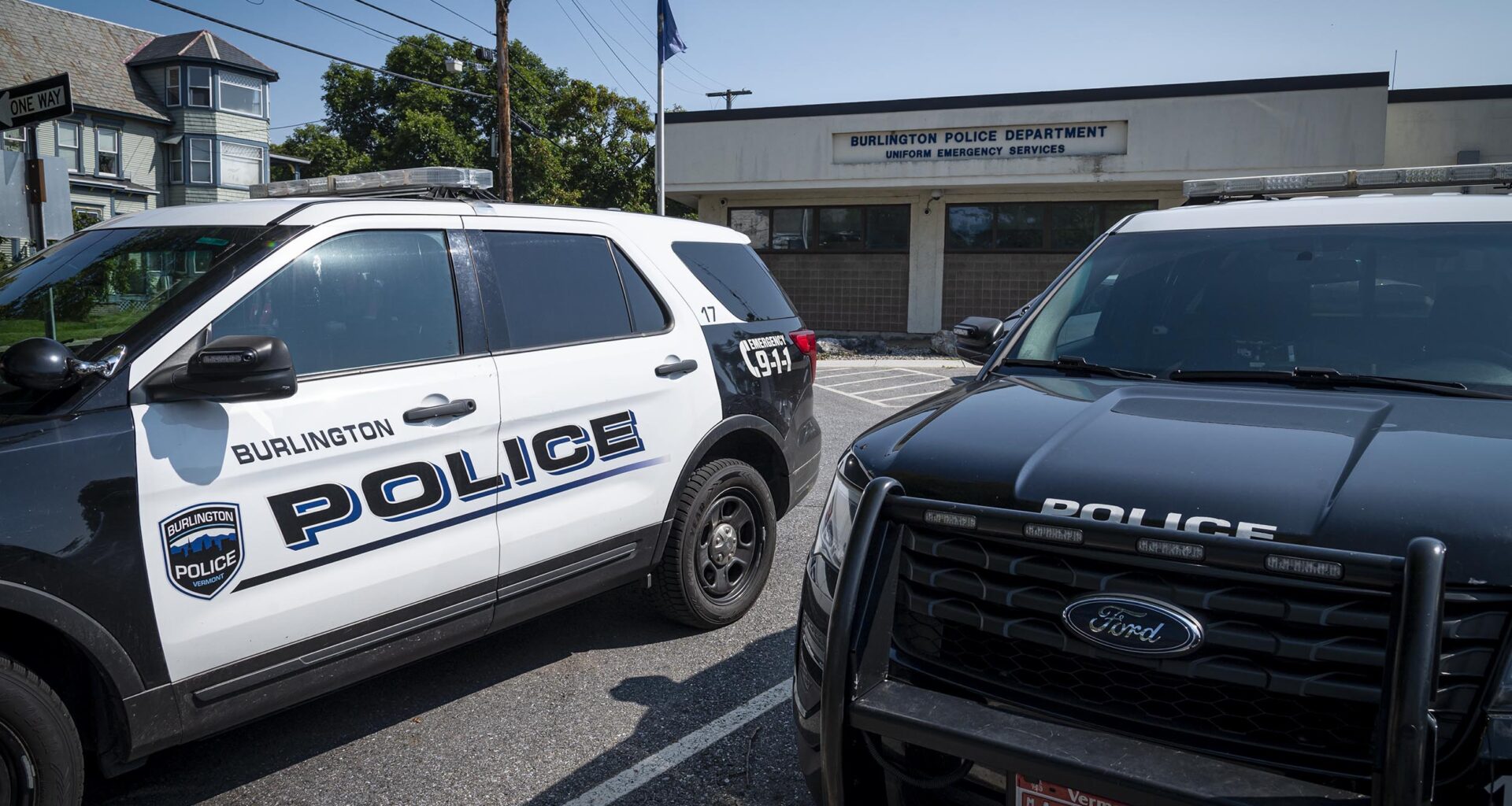 Burlington Police Department cruisers parked outside the department in Burlington on Monday, August 26, 2024. Photo by Glenn Russell/VTDigger
Burlington Police Department cruisers parked outside the department in Burlington on Monday, August 26, 2024. Photo by Glenn Russell/VTDigger
Burlington plans to terminate a mental health response program within its police department, called CARES, that fell short of its vision. The piece of police reform will be left behind by the city, once state funds to launch the program lapse at the end of this year.
In its absence, Burlington Mayor Emma Mulvaney-Stanak maintains that the Howard Center has the capacity and is better suited to take on any work championed by the sunsetting program. But at a Monday night City Council meeting, many councilors expressed skepticism that a transition would be so seamless.
Underlying councilors’ concerns begged the question, are there any exit ramps?
Employees at the Howard Center said it has the capacity to take on the work of the CARES team. It’s a social services organization that the Queen City supports with hundreds of thousands of dollars. But some city councilors aren’t sure their services will meet the same needs.
“We know there’s a gap here if CARES goes away,” councilor Buddy Singh, D-South, said during the meeting.
When city officials first devised the CARES program, it was slated to include a supervisor, two clinicians and an emergency medical technician or a registered nurse. CARES, an acronym for Crisis Assessment, Response and Engagement Service, was designed to provide more long-term casework, rather than be a first responder to people in crisis, Burlington Police Chief Shawn Burke said.
But when Mulvaney-Stanak took office in 2024, the program had no staff, she said during an interview in early November. All three roles sat empty.
The first CARES position wasn’t filled until earlier this year and the second was only filled within the last six months, Mulvaney-Stanak said. In late October, Burke said one of those two employees gave notice that she would leave in early November upon finding out the program would end.
“This isn’t a huge loss of human resources and it’s work that will have to be outsourced from the police department,” Burke said.
Burke said the city was unable to fill the nurse position for regulatory reasons. In Mulvaney-Stanak’s memo to the City Council about ending the CARES program, she blamed the vacant nurse role on “unsuccessful negotiations” with the University of Vermont Medical Center.
Leaving that role unfilled would create funding complications.
Without the nurse position, the team couldn’t provide the same care it set out to, Mulvaney-Stanak said. In response, the state scaled back the funds it was giving to the city, she said.
With state funds set to expire at the end of the year, the city decided not to continue the program, Mulvaney-Stanak said.
The CARES team originally came about in the wake of 2020 Black Lives Matter protests that called on city officials to rethink policing. For years down the line, community members were pushing city officials to consider how they could better support people in mental health crises, Mulvaney-Stanak said.
It was modeled after the CAHOOTS crisis response model, which was used in Eugene, Oregon, to deploy a crew of crisis workers to respond when someone is in a mental health crisis.
Former Burlington Mayor Miro Weinberger considered partnering with the Howard Center to provide crisis management, before later deciding the city wanted to run the program within the police department.
Mulvaney-Stanak said that housing the CARES team within the police department proved problematic for a number of reasons.
Someone seeking help from the CARES team would have their information stored within police software, Mulvaney-Stanak said. That made their mental health records public records and did not provide them with protections under medical privacy laws, she said.
People in the CARES team were also supervised by the police chief, who isn’t best suited to manage mental health casework, she said.
When the program sunsets at the end of the year, Mulvaney-Stanak said the Howard Center’s street outreach team will fill the gaps.
During Monday night’s meeting, councilor Sarah Carpenter, D-Ward 4, said she was surprised to get the memo from the mayor about the program ending when the council had received very few updates on its progress.
It’s still unclear what mental health crises the city is responding to well, and where the gaps are, she said. She posed the question: “What are we still missing?”
Councilor Melo Grant, P-Central, said she was disappointed the program was ending only a couple years after city officials worked to put it in place. Later in the meeting, Grant said she found out CARES was ending when a constituent reached out to her.
That constituent had received help from the CARES team after a traumatic experience, Grant said. “They were very upset to find out that the program is being defunded,” she said.
Grant said she did not believe the CARES team duplicated services provided by the Howard Center, and that it had a distinct role.
Katherine Levasseur, a spokesperson for the Howard Center, said the organization has an equivalent of six full-time employees on its street outreach team.
“We feel well-prepared to take on this additional work,” Beth Holden, who handles client services for the Howard Center, said at Monday’s meeting.
